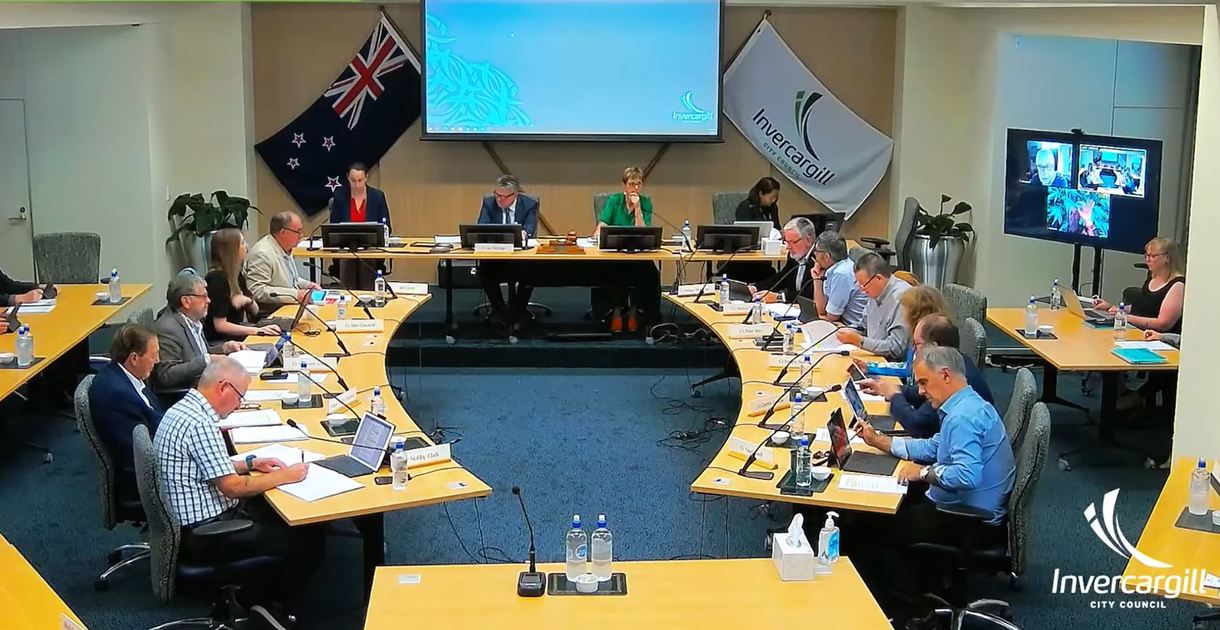Council hikes rent by 35%, but there's some good news
Paul Taylor
04 March 2021, 4:47 AM
 Yesterday's Invercargill City Council meeting was livestreamed to the community
Yesterday's Invercargill City Council meeting was livestreamed to the communityA 35% rent hike for people living in Invercargill City Council-owned community housing will go ahead, but it will be staggered over two years
Councillors yesterday approved the increase for its 215 social housing units.
However, there is some good news for the tenants.
While the increase was expected to see them pay about $40 per week more each, some investigative work by deputy mayor Nobby Clark has revealed the real figure is likely to be around $8 per week.
That's because the tenants are entitled to a Work & Income accommodation supplement.
Cr Clark said many believed they were not eligible, likely because they had incorrectly stated on forms or online that the council was a registered community housing provider.
For registered community housing providers, rents are capped to 25% of a tenant's income.
But, under current legislation, councils can't be registered community housing providers, instead they're classed as private landlords.
That means anyone who earns up to $520 a week, and has savings or KiwiSaver less than $8100, is eligible for full support, or for lesser amounts beyond those thresholds.
"I'm thinking that most of our clients wouldn't have substantial amounts in either of those categories," Clark said.
"And so what [WINZ] said is the general formula they use is that if the rent goes up by X amount of dollars, roughly speaking, 70% of that will be paid by the accommodation supplement, the other 30% it's the tenant.
"When I do some basic figures around that . . . the range of increase our clients or tenants are likely to get is somewhere between $6 or $7 or $8."
Councillors, at yesterday's infrastructure services committee, were given three options - to increase by 35% immediately, to stagger the 35% increase over two years, or to subsidise through general rates.
Senior council land advisor Heather Guise told councillors the subsidy would be about $59,000 from general rates and that would need a separate public consultation process.
The increase will allow the council to meet Health Homes Standards and also replace its housing stock, over 61 years with option one, or 63 years with option two.
Cr Alex Crackett said during the consultation council had been given a "clear steer" by the community that it wanted the council to provide community housing, but didn't feel it was fair to subsidise it out of the general rates.
"In doing that you're only subsidising a portion of the populace that actually live in our social housing when across the board there are a lot of people who live in our city who are in hardship," Crackett said.
She said it was forward thinking to meet the Health Homes Standard, and the accommodation supplement "considerably drops the amount" tenants will have to pay.
Cr Clark also noted the Government is increasing benefits by 3.1% from April 1, which for a couple of joint national super equates to an increase of about $19 per week.
Recently-elected Cr Marcus Lush was also in favour of option 2, although he criticised the council for the way they'd informed the tenants.
"I think the optics are bad," Lush said. "We've got the new mall going in, we've got cold housing, so I'm absolutely in favour of the heatpumps going in.
"I think as a landlord we've got to look like we care about our tenants. To propose a 35% [rent] increase weeks before Christmas I think was not the measure of a good landlord. So that concerns me."
He said the tenants needed education about how to use heatpumps, especially the elderly, to ensure they can use them efficiently and see their bills increase.
Councillors voted unanimously for option two, which will see the increase staggered over two years.
That will see them pay about $4 per year extra this year and next.
ACCOMMODATION
AG | TRADES & SUPPLIES
